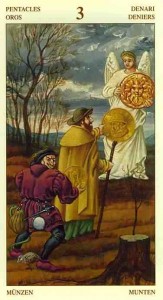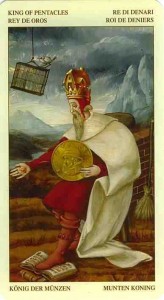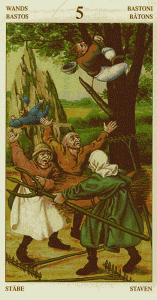 “Tell me something about gluttony,” I said with a mouthful of food.
“Tell me something about gluttony,” I said with a mouthful of food.
I find it interesting that cards come in groups. I mean, for a while I was drawing lots of fives, especially the five of cups. Then I pulled a bunch of kings in a row while I was finishing up my own kings. Now two days in a row I get the Three of Coins.
When I first learned this card, I learned it as craftsmanship, artisanship, and skill. It was the card of the artist. Looking at it yesterday, I realized I missed something essential: teamwork. And today, this little white book says improvement. First, there’s a dirty-looking scoundrel who seems to be saying, “Heh-heh-heh, if I pay off this angel dude, I get to go to heaven! Cool!” Then there’s the middle guy saying, “Here, angel, take this coin, for you are of wonderous beauty!” Then there’s the angel who sort-of looks like he’s thinking, “Geez, why do these guys keep giving me so many coins?” As fast as he can, he gives coins out to everyone in need— but new coins keep appearing in his arms. It is a progression towards selfless giving.
(Brief aside: as a professional arborist, I must say there’s no way that little grafted twig in the foreground is going to take. If you graft a top onto a rootstock, the two need to be the same size. If you graft a twig onto a tree, it needs, likewise, to be grafted onto a similar-sized twig. And the tree needs to be alive. A vibrant twig dies dead rootstock. If this is the situation, I recommend planting seeds.)
Going back to what I thought I missed: teamwork. The truth is, sometimes it’s really hard to see the rest of the team. The craftsmanship takes total focus. As skill improves toward perfection, the rest of the team may be forgotten. The mason, upon completing a building, cannot forget the architect who drew the plans. Students, upon finishing a book, cannot think themselves top in the field and forget the author of primary research. The seed cannot forget the soil that anchors it. The potter cannot forget the formless mud or the Supreme Mud Former whose actions s/he mimics. None can forget the teacher. In reverse, the architect cannot take pride in how well his plans turned out without giving thanks to the mason. The author would be a nameless nobody without a readership. The soil would erode without anchoring roots. And both potters and gods cease to exist without their creations.
We cannot forget our origins. We do not exist in a vacuum. The definition of “individual” is nebulous. A solitary success implies a team. To think otherwise is pure venom. One could read in the Bruegel Tarot image that when one learns to give without thought of receiving, the gifts received are endless.





